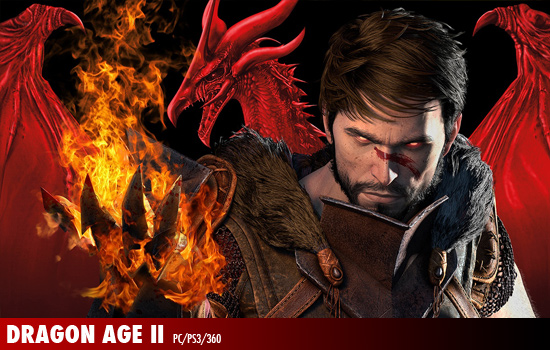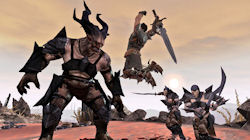
Publisher: EA
Developer: Bioware
MSRP: $59.99
by: Mike "Pheriannath" Katsufrakis
Here we have a curious sequel. Dragon Age: Origins was a sprawling epic that paid tribute to the old Infinity Engine games that put Bioware on the map and was well-loved for it. While Bioware’s other big series, Mass Effect was heading in a more streamlined direction, Dragon Age stood in stark contrast with its deep, tactical combat, massive quantity of sidequests, and multiple origins for your character, allowing for deeper roleplaying than most RPGs of late.
Rather than remain faithful to the style set forth by its predecessor, Dragon Age II comes off as a sort of bastard child of Dragon Age: Origins and Mass Effect. You assume the role of Hawke, who is revealed to be a survivor of the razing of Lothering in the previous game. While on the run from Darkspawn, you’re rescued by a familiar character who starts your quest and helps you make your way to Kirkwall, an oppressive city where the story of Hawke’s rise to prominence takes place.
Thanks to the decision to give Hawke a voice, conversations now use Mass Effect’s wheel-based selection system, and adds a contextual icon to your selection so you’re easily able to tell if Hawke’s response will be noble, aggressive or if (s)he is about to be a snarky git. Choices that lead to expanded conversation options are easily recognizable, and in certain situations, you can even turn the conversation over to one of your party members. Letting Anders deal with a mage or having Varric lie your way out of a situation is a nice touch.
Combat has been altered to be more action-oriented, and plays out a lot faster than before - going so far as to force console players to have to manually trigger their basic attacks. Though you can certainly pause & play your way to victory, the default tactics for your companions are often more than enough while playing on the default difficulty as long as you’re mindful of the situation. Mages have been hit pretty hard with balance tweaks, and don’t feel nearly as overpowered as before.
 Once you’ve invested a few hours into the game, the fact that this sequel was churned out in just over a year starts beating you over the head. Every mansion, cave or segment of the Deep Roads you encounter uses the same layout, with the extremely obvious shortcut of different doors being locked or passages filled with what appears to be concrete. Remember that nook with a treasure in it? Chances are the next time you visit a “different” cave, there will be treasure in the same location!
Once you’ve invested a few hours into the game, the fact that this sequel was churned out in just over a year starts beating you over the head. Every mansion, cave or segment of the Deep Roads you encounter uses the same layout, with the extremely obvious shortcut of different doors being locked or passages filled with what appears to be concrete. Remember that nook with a treasure in it? Chances are the next time you visit a “different” cave, there will be treasure in the same location!
Though giving Hawke a personality and voice really does help keep dialogue and the story moving, it takes a lot of options and nuance out of conversation - it’s much easier to have eight responses to a question (rather than three or four) when you don’t have to record voice. The loss of conversation options is at its most painful when you realize that Bioware has taken out the ability to speak to your party members during downtime and ask about their histories, what they think about the current situation, or even to make fun of them. Instead, these conversations are limited to their personal quests.
This review is beginning to sound like a laundry list of gripes about a bad game, but the fact of the matter is that Dragon Age II is still extremely solid in most regards. The recycling of assets and abundance of “FedEx” quests is unfortunate, but the story it tells is still an interesting one, and the combat, while different, moves a lot faster and helps keep things moving. I particularly enjoyed the change to the art style, which gives the game a much-needed “look”.
So is it as good as Origins? No. Is it still worth playing? Absolutely. Let’s just hope they don’t try and crank out an annual sequel.
Rating: 